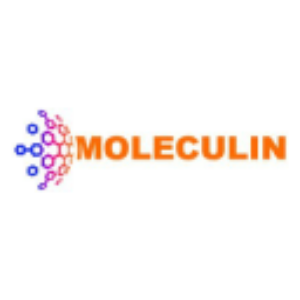Moleculin Reports Positive Topline Efficacy Results from U.S. Phase 1B/2 Clinical Trial Evaluating Annamycin for the Treatment of Soft Tissue Sarcoma Lung Metastases (MB-107)
Rhea-AI Summary
Positive
- Clinical Benefit Rate of 59.4% achieved with 18 stable disease and 1 partial response cases
- Phase 2 results exceeded typical second-line monotherapy expectations with 13.5 months OS
- Patients with fewer prior therapies showed strong results (19.9 months OS/127 days PFS)
- No cardiotoxicity demonstrated across all subjects
- Market opportunity projected to reach $2.6B by 2030
- Drug has Fast Track Status and Orphan Drug Designation from FDA
Negative
- No Complete Response (CR) achieved in any subjects
- Overall median PFS was relatively short at 63 days
- Results suggest limited efficacy in heavily pretreated patients
Insights
Moleculin's Annamycin shows promising efficacy in late-line STS lung metastases with 59.4% clinical benefit rate and 20-month survival without cardiotoxicity.
The topline results from Moleculin's Phase 1B/2 trial of Annamycin demonstrate significant potential in a difficult-to-treat population. The 59.4% clinical benefit rate (comprised of stable disease and partial response) is particularly impressive considering the heavily pretreated nature of the study population, with a median of 6 prior therapies in the Phase 2 cohort.
What's striking is the overall survival of 13.5 months at the 330 mg/m² dose level, which exceeds typical results for second-line monotherapies (8-12 months) despite being used in what appears to be a seventh-line setting. This suggests Annamycin might offer substantial benefit even after multiple treatment failures. The extended survival of 19.9 months observed in patients with fewer prior therapies (≤2) further supports potential earlier-line use.
The correlation between clinical benefit and improved outcomes is mechanistically reassuring - patients achieving stable disease or partial response after ≥2 cycles showed markedly better survival (19.7 months vs. overall 13.5 months). This indicates that early response assessment could potentially identify patients likely to derive substantial benefit.
The absence of cardiotoxicity is particularly noteworthy, as this is a common limitation with anthracyclines, suggesting Annamycin may offer a safer alternative in this class. With Orphan Drug and Fast Track designations already secured, Moleculin has regulatory advantages that could accelerate development.
With soft tissue sarcoma affecting approximately 13,500 new patients annually and a projected market growth to
Annamycin delivering better performance 7th line than would be expected even in 2nd line for monotherapy
Responders (Stable Disease or Partial Response) after 2 cycles of Annamycin showed improvement in OS and Progression Free Survival (“PFS”)
Clinical Benefit Rate (“CBR”) was
Potential to address 13,500 new incidents of STS each year and market opportunity expected to grow to
On-demand video webcast with members of the Moleculin management team and internationally renowned Key Opinion Leaders available Thursday, June 5th
HOUSTON, June 04, 2025 (GLOBE NEWSWIRE) -- Moleculin Biotech, Inc., (Nasdaq: MBRX) (“Moleculin” or the “Company”), a late-stage pharmaceutical company with a broad portfolio of drug candidates targeting hard-to-treat cancers and viruses, today reported positive topline efficacy results from its completed U.S. Phase 1B/2 clinical trial evaluating Annamycin for the treatment of soft tissue sarcoma lung metastases (“STS lung mets”) (MB-107).
The MB-107 trial was a multi-center, open-label, single-arm monotherapy study that in Phase 1B determined the Maximum Tolerable Dose and Recommended Phase 2 Dose (“MTD”, “RP2D” respectively) and safety of Annamycin and in Phase 2 explored the efficacy of Annamycin as a single agent for the treatment of subjects with STS lung mets for which chemotherapy was considered appropriate. For more information about the MB-107 trial visit clinicaltrials.gov and reference identifier NCT04887298.
“These positive topline results from MB-107 are incredibly encouraging. The impact Annamycin demonstrated on median overall survival, particularly with patients who received multiple prior chemotherapy regimens, exceeded expectations. Additionally, the improvement seen with PFS after two doses represents a real potential for Annamycin to provide a meaningful treatment option for the treatment of STS lung mets,” commented Walter Klemp, Chairman and Chief Executive Officer of Moleculin. “Looking ahead, we believe these results strongly support further evaluations of Annamycin for the treatment of STS lung mets and we look forward to exploring opportunities to potentially bring this important treatment option to patients.”
Topline Efficacy Results Summary
- Clinical Benefit Rate (“CBR”) was
59.4% (n=32), comprised of 18 subjects with stable disease and 1 subject with a partial response (no subjects achieved Complete Response or CR) - Progression Free Survival (“PFS”) & Overall Survival (“OS”):
- Dose and regimen optimized subjects demonstrated PFS of ~4 months and OS of ~20 months
- Overall (N=36) Median PFS was 63 days, with a
95% Confidence Interval (“CI”) between 43 and 105 days - Median OS was 411 days, with a
95% CI between 241 and 583 days
- In Phase 2 (N=17) at 330 mg/m2:
- Median PFS was 105 days and OS for all-comers (median 6 prior therapies) of 13.5 months exceeded typical results for 2nd line monotherapies (8-12 months)1
- OS/PFS was higher (19.9 months/127 days) for subjects with fewer prior therapies (≤2) (n=7) and receiving doses of Annamycin ≤ 330 mg/m2 (the RP2D)
- Results suggest overall disease control was better at 330 mg/m2, but once combined with Phase 1B data OS and PFS was the same as overall
- Subjects achieving a Partial Response (“PR”) or Stable Disease (“SD”) with ≥2 cycles also experienced higher OS/PFS (19.7 months/122 days), demonstrating that achieving CBR from Annamycin resulted in better outcomes
- No cardiotoxicity demonstrated in all subject data as noted by an independent Expert
Annamycin currently has Fast Track Status and Orphan Drug Designation from the FDA for the treatment of relapsed or refractory acute myeloid leukemia, in addition to Orphan Drug Designation for the treatment of soft tissue sarcoma. Furthermore, Annamycin has Orphan Drug Designation for the treatment of relapsed or refractory acute myeloid leukemia from the EMA.
On-Demand Webcast Details
An on-demand Virtual STS Lung Mets KOL Webcast to discuss the MB-107 data will be available for investors, analysts, and other interested parties on Thursday, June 5, 2025 beginning at 8:30 AM ET.
For the event, Walter Klemp, Chairman and Chief Executive Officer, and Dr. Paul Waymack, Senior Chief Medical Officer of Moleculin will be joined by Key Opinion Leaders: Mohamad Cherry, MD, Medical Director of Hematology at Atlantic Health System; Prof. Bernd Kasper, Sarcoma Unit of the Mannheim Cancer Center (MCC) at the Mannheim University Medical Center, University of Heidelberg; and Sant P. Chawla, MD, Director, Sarcoma Oncology Center, Director, Cancer Center of Southern California.
Interested participants and investors may access the on-demand video webcast on the Events page of the Investors section of the Moleculin website, moleculin.com. The webcast will be accessible for 90 days.
About STS Lung Mets
Soft tissue sarcoma is a type of cancer that originates in the soft tissues of the body, including muscles, tendons, fat, blood vessels and nerves. Lung metastases are a common occurrence in STS, and can impact overall survival. According to The American Cancer Society approximately 13,500 individuals, both adults and children, will be diagnosed with soft tissue sarcoma in 20252. Soft tissue sarcomas account for
MB-107 Study Design
In Phase 2, Annamycin was administered as an intravenous (IV) infusion over 2 hours on Day 1, followed by 20 days off (1 cycle = 21 days). Subjects visit the study site every 21 days (±3 days) at which time safety monitoring – including for adverse events (AEs), as well as a physical examination, laboratory evaluations (clinical chemistry, complete blood count), vital signs, weight measurements, Eastern Cooperative Oncology Group (ECOG) performance status, and electrocardiograms (ECGs) – is performed, followed by an IV infusion of study drug. Cardiac function is followed by echocardiogram (ECHO) scans at screening, at the end of the first two cycles and then following every other cycle thereafter, at the End of Treatment visit, and if feasible, during follow up at 6 months (±1 month) and 1 year (±1 month) after study drug discontinuation. As long as the Investigator considers that the benefits of treatment with Annamycin continue to outweigh the risks, treatment will continue every 21 days until tumor progression is observed or unacceptable toxicity occurs.
Tumor response is monitored every 6 weeks (±1 week) from Cycle 1 Day 1 during treatment, at the End of Treatment visit, and then every 3 months (±1 month) until disease progression using RECIST 1.1 criteria. Those subjects who leave the study after a maximum response is achieved and who do not start another therapy will be followed every 3 months (±1 month) for progression-free survival (PFS). If a subject receives further therapy after discontinuing from the study, they will be followed only for overall survival (OS) and if feasible, follow-up ECHO scans at 6 months (±1 month) and 1 year (±1 month) were conducted after study drug discontinuation.
About Moleculin Biotech, Inc.
Moleculin Biotech, Inc. is a Phase 3 clinical stage pharmaceutical company advancing a pipeline of therapeutic candidates addressing hard-to-treat tumors and viruses. The Company’s lead program, Annamycin, is a next-generation highly efficacious and well tolerated anthracycline designed to avoid multidrug resistance mechanisms and to lack the cardiotoxicity common with currently prescribed anthracyclines. Annamycin is currently in development for the treatment of relapsed or refractory acute myeloid leukemia (AML) and soft tissue sarcoma (STS) lung metastases.
The Company has begun the MIRACLE (Moleculin R/R AML AnnAraC Clinical Evaluation) Trial (MB-108), a pivotal, adaptive design Phase 3 trial evaluating Annamycin in combination with cytarabine, together referred to as AnnAraC, for the treatment of relapsed or refractory acute myeloid leukemia. Following a successful Phase 1B/2 study (MB-106), with input from the FDA, the Company believes it has substantially de-risked the development pathway towards a potential approval for Annamycin for the treatment of AML. This study remains subject to appropriate future filings with potential additional feedback from the FDA and their foreign equivalents.
Additionally, the Company is developing WP1066, an Immune/Transcription Modulator capable of inhibiting p-STAT3 and other oncogenic transcription factors while also stimulating a natural immune response, targeting brain tumors, pancreatic and other cancers. Moleculin is also engaged in the development of a portfolio of antimetabolites, including WP1122 for the potential treatment of pathogenic viruses, as well as certain cancer indications.
For more information about the Company, please visit www.moleculin.com and connect on X, LinkedIn and Facebook.
Forward-Looking Statements
Some of the statements in this release are forward-looking statements within the meaning of Section 27A of the Securities Act of 1933, Section 21E of the Securities Exchange Act of 1934 and the Private Securities Litigation Reform Act of 1995, which involve risks and uncertainties. Forward-looking statements in this press release include, without limitation, the timing of the release of the initial data on the first 45 subjects in the trial and the Company’s ability to reconcile the US and EU protocols with the FDA and EMA, respectively. Moleculin will require significant additional financing, for which the Company has no commitments, in order to conduct its clinical trials as described in this press release, and the milestones described in this press release assume the Company’s ability to secure such financing on a timely basis. Although Moleculin believes that the expectations reflected in such forward-looking statements are reasonable as of the date made, expectations may prove to have been materially different from the results expressed or implied by such forward-looking statements. Moleculin has attempted to identify forward-looking statements by terminology including ‘believes,’ ‘estimates,’ ‘anticipates,’ ‘expects,’ ‘plans,’ ‘projects,’ ‘intends,’ ‘potential,’ ‘may,’ ‘could,’ ‘might,’ ‘will,’ ‘should,’ ‘approximately’ or other words that convey uncertainty of future events or outcomes to identify these forward-looking statements. These statements are only predictions and involve known and unknown risks, uncertainties, and other factors, including those discussed under Item 1A. “Risk Factors” in our most recently filed Form 10-K filed with the Securities and Exchange Commission (SEC) and updated from time to time in our Form 10-Q filings and in our other public filings with the SEC. Any forward-looking statements contained in this release speak only as of its date. We undertake no obligation to update any forward-looking statements contained in this release to reflect events or circumstances occurring after its date or to reflect the occurrence of unanticipated events.
Investor Contact:
JTC Team, LLC
Jenene Thomas
(908) 824-0775
MBRX@jtcir.com
1 https://www.researchandmarkets.com/reports/5893492/soft-tissue-sarcoma-market-global-industry
2 American Cancer Society. Cancer Facts & Figures 2025. Atlanta: American Cancer Society; 2025. Available at https://www.cancer.org/research/cancer-facts-statistics/all-cancer-facts-figures/2025-cancer-facts-figures.html
3 Comandone A, et al; “Salvage Therapy in Advanced Adult Soft Tissue Sarcoma: A Systematic Review and Meta-Analysis of Randomized Trials”; The Oncologist 2017;22:1518–1527










